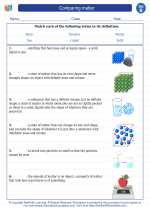Matter
Matter is anything that has mass and takes up space. It is the "stuff" that makes up everything in the universe. Matter can exist in different states - solid, liquid, or gas. These states depend on how its particles are arranged and how they move.
States of Matter
Solid: In a solid, particles are closely packed together and vibrate in place. Solids have a definite shape and volume.
Liquid: In a liquid, particles are still close together, but they can move around each other. Liquids have a definite volume but take the shape of their container.
Gas: In a gas, particles are far apart and move freely. Gases have neither a definite shape nor volume and expand to fill their container.
Properties of Matter
Matter has properties that can be observed and measured. These include:
- Mass: The amount of matter in an object.
- Volume: The amount of space matter takes up.
- Density: How tightly packed the matter is within an object.
- Solubility: How well a substance dissolves in another.
- Conductivity: The ability to conduct heat or electricity.
Changes in Matter
Matter can undergo physical and chemical changes.
- Physical Change: A change in the form or appearance of matter without creating a new substance. Example: melting ice.
- Chemical Change: A change that produces new substances with different properties. Example: burning wood.
Study Guide
Here are some questions to help you study matter:
- What is matter?
- What are the three states of matter?
- What are some properties of matter?
- What is the difference between a physical and chemical change?
Remember to review the definitions and examples of each concept, and try to apply them to real-life situations to deepen your understanding of matter.
[Matter] Related Worksheets and Study Guides:
.◂Science Worksheets and Study Guides Second Grade. Comparing matter
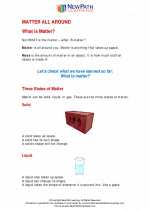
 Activity Lesson
Activity Lesson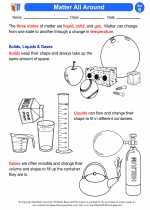
 Worksheet/Answer key
Worksheet/Answer key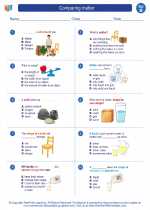
 Worksheet/Answer key
Worksheet/Answer key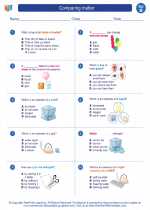
 Worksheet/Answer key
Worksheet/Answer key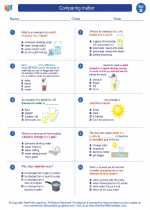
 Vocabulary/Answer key
Vocabulary/Answer key